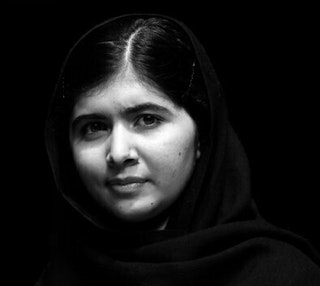
Malala Yousafzai
Messenger of peace, known as Malala throughout the world. Pakistani activist for the education of women and the youngest-ever recipient of the Nobel Peace Prize.
Featured lesson
Speaking Up for the Right to Education - I am MalalaMalala Yousafzai was born in 1997 in the Swat district of Pakistan. She was educated by her father, Ziauddin, a poet and the owner of several private schools, who dissuaded her from a career as a doctor and encouraged her to pursue politics instead.
In 2007, the Taliban, an extremist Islamic group, began fighting the government for control of Swat. They replaced the existing secular laws with more restrictive religious laws, attacking those who disobeyed. In December 2008, they declared that girls would no longer be allowed to go to school and began segregating schools that allowed both boys and girls. In search of reporting, the BBC contacted Ziauddin to find students who would share how the conflict was affecting them, but they all felt it was too dangerous to speak out against the Taliban. Finally, Ziauddin asked Malala, who was only 11 at the time. She was willing to take the risk.
Originally posting under the pseudonym Gul Makai, Malala shared her stories and commentary about life under the Taliban. After several months, inspired by her father’s pro-education activism, Malala eventually revealed her real name and began openly advocating for girls to have the same human right to an education as boys. Even at her young age, she quickly became a powerful voice for education in her country, even convincing Pakistan’s prime minister to expand women’s education in Swat.
Her international renown came with increased danger—the leaders of the Taliban plotted to assassinate her. On October 9, 2012, a masked gunman boarded a bus full of girls on their way home from school and demanded Malala identify herself. When she made her identity known, she was shot from just a few feet away, the bullet passing through her head and into her neck and shoulder. The gunman fled, believing she would not survive. Malala was rushed to the hospital, where she told her father, “I’m going to be fine, and victory will be ours,” before falling into a coma. The best doctors treated Malala, first in Pakistan, and then in Germany and the U.K. After extensive brain surgery, she was well enough to go home by January 2013, and she returned to school just a few months later.
The Taliban tried to silence Malala and others like her, but their violence only caused people to rally behind this young activist and her cause. With her father, whom she calls her ally and inspiration, she established the Malala Fund, a charity dedicated to giving every girl access to free, safe, quality education. The fund invests in developing educators and activists and has given support to girls fighting poverty, wars, child marriage, and gender discrimination. Malala has also visited many world leaders, calling on them to invest in “books, not bullets” and holding them accountable for their promises to girls. In recognition of her work, she received the Nobel Peace Prize in December 2014, becoming the youngest-ever Nobel laureate.
In 2018, Malala began studying philosophy, politics, and economics at the University of Oxford. She graduated in 2020 and has continued her fight for education and equality. With more than 130 million girls out of school today, there is much more work to be done.
“I raise up my voice, not so that I can shout, but so that those without a voice can be heard. Those who have fought for their rights: Their right to live in peace. Their right to be treated with dignity. Their right to equality of opportunity. Their right to be educated.”
Help Us Protect Human Rights
Please give now. Your contribution will make a difference in the critical effort to achieve equal rights for all.